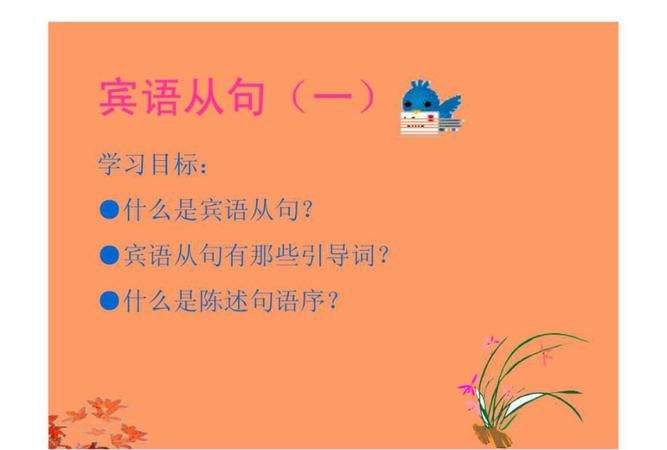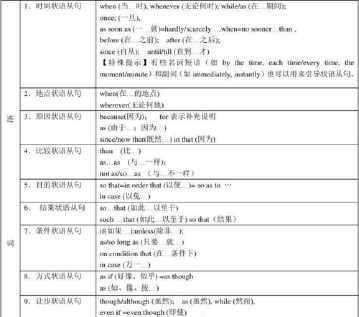本文目录
状语从句
定语从句
一、 定语从句与引导词
定语从句是在复合句中修饰某一名词或代词的从句。被修饰的名词或代词叫做选行词,
而引导定语从句的词叫引导词,有关系代词和关系副词两类。
懂得什么样的先行词后用什么样的引导词是学好定语从句的关键。
宾语从句(一) 宾语从句在复合句中作主句的宾语。宾语从句常由that引导,在口语中常省略。 当主句中谓语动词是现在或将来时态时,从句中谓语动词不受主句中谓语动词时态的 影响,按需要可以使用任何时态。如: She says (that) she works from Monday to Friday. 她说她从周一至周五上班。(从句是一般现在时) She says (that) she will leave a message on his desk. 她说她要在他桌子上留个便条。(从句是一般将来时) She says (that) she has never been to Mount Emei. 她说她从来没有去过峨眉山。(从句是现在完成时) 当主句谓语是过去时态,从句中的时态一般用表示过去的某种时态。如: He said there were no classes yesterday afternoon. 他说昨天下午没有课。(从句是一般过去时) He said (that) he was going to take care of the baby. 他说他会去照看这个婴儿。(从句是过去将来时) He said (that) they were having a meeting at that time. 他说他们那时正在开会。(从句是过去进行时) *当主句谓语是过去时态,而宾语从句叙述某一客观真理(事实)时, 宾语从句的时态则用一般现在时。如: The teacher told us(that) nothing is difficult if you put your heart into it. 老师告诉我们世上无难事只怕有心人。 She said (that) her father is twenty-eight years older than her. 她说她父亲比她大二十八岁。 He said that light travels much faster than sound. 他说光传播比声音传播快得多。 宾语从句(二) 由连接代词或连接副词引导的宾语从句。 引出名词性从句的连词whether和if,在引出宾语从句时,用法和意义相同。但是只能引出宾语从句和不在句首的主语从句,而whether除了引出宾语从句外,还可引出主语从句、表语从句和同位语从句。例如: We don't know whether (if) it is right. 我们不知道它是否正确。 The question is whether she should do that. 问题在于她是否应该做那件事。 Whether it is true remains a question. 是真是假还是个问题。 试比较: 当if从句处在主句之后作“是否”讲时,引出的是宾语从句。例如: I don't know if it is true. 我不知道这事是否真实。 当if从句在主句之前作“如果”讲,则引出状语从句。例如: I shall go there if I have time. 如果我有时间,我将到那儿去。
状语从句
(Adverbial Clause)
一 状语从句的种类
§ 1状语从句的种类
用来修饰谓语动词、其它动词、定语、状语或整个句子的从句叫做状语从句。状语从句可分为:
1.时间状语从句;(adverbial clause of time)
2.地点状语从句;(adverbial clause of place)
3.原因状语从句;(adverbial clause of cause)
4.条件状语从句;(adverbial clause of condition)
5.目的状语从句;(adverbial clause of purpose)
6.让步状语从句;(adverbial clause of concession)
7.比较状语从句;(adverbial clause of comparison)
8.程度状语从句;(adverbial clause of degree)
9.方式状语从句;(adverbial clause of manner)
10.结果状语从句。(adverbial clause of result)
§2状语从句的时态特点
一般情况下,时间和条件状语从句的谓语动词一般用“一般现在时”表示“一般将来时”,用“现在完成时”表示“将来完成时”。例如:
I will call you as soon as I arrive in Beijing. 我一到北京就给你打电话。(这是由as soon as引导的时间状语从句,从句中的谓语动词arrive是一般现在时,表示一般将来时,决不可用will arrive)
As soon as I have finished this work, I will go home. 我一完成此工作,就回家。(从句中的谓语动词用现在完成时have finished,表示将来完成时,决不可用will have finished)
If he comes back, please let me know.如果他回来了,请通知我。(从句中的谓语动词用comes back,表示一般将来时,决不可用will come back)
二 时间状语从句
§3时间状语从句(adverbial clause of time)
1.由when, while, as引导的时间状语从句。例如:
When you think you know nothing, then you begin to know something.当你以为自己一无所知的时候,你就是在开始知道一些事物了。
When truth is buried under the ground it grows, it chokes, it gathers such an explosive force that on the day it bursts out , it blows up everything with it.当真理被埋在地下的时候,它在生长,它感到压抑,它蓄存着这么一种爆炸性力量,一旦冒出,它就会炸破一切!
Strike while the iron is hot. 趁热打铁。
Will you watch my clothes while I have a swim. 我游泳的时候,请你照看一下我的衣服。
You can feel the air moving as your hand pushes through it. 当你的手在空气中挥动的时候,你就能感觉到空气在流动。
Our headmaster laughed as she spoke.我们的校长边谈边笑。
【区别】when, while和as的区别:when引导的从句的谓语动词可以是延续性的动词,又可以是瞬时动词。并且when有时表示“就在那时”。例如:
When she came in, I stopped eating.她进来时,我在吃饭。(瞬时动词)
When I lived in the countryside, I used to carry some water for him.当的住在农村时,我常常为他担水。(延续性的动词)
We were about to leave when he came in.我们就要离开,就在那时他进来了。
While引导的从句的谓语动作必须是延续性的,并强调主句和从句的动作同时发生(或者相对应)。并且while有时还可以表示对比。例如:
While my wife was reading the newspaper, I was watching TV. (was reading是延续性的动词,was reading和was watching同时发生)
I like playing football while you like playing basketball.我喜欢踢足球,而你喜欢打篮球。(对比)
As表示“一边……一边”,as引导的动作是延续性的动作,一般用于主句和从句动作同时发生;as也可以强调“一先一后。例如:
We always sing as we walk.我们总是边走边唱。(as表示“一边……一边”)
As we was going out, it began to snow.当我们出门时,开始下雪了。(as强调句中两个动作紧接着先后发生,而不强调开始下雪的特定时间)
2.由before和after引导的时间状语从句。注意before引导的从句不再用否定式的谓语,并且当before引导的从句位于主句之后,有时译成“就,才”。还要注意主句和从句之间的时间关系。当主句用将来时,从句总是用现在时;如果before引导的从句谓语用的是过去时,则主句动词多用过去完成时,这样以便体现动作发生的先后。After表示主句动作发生在从句动作之后。主句和从句的动作的时间关系正好与before引导的从句相反。例如:
It will be four days before they come back. 他们要过四天才能回来。
Einstein almost knocked me down before he saw me.爱因斯坦几乎把我撞倒才看到我。
My father had left for Canada just before the letter arrived.我父亲恰好在信到之前去加拿大了。
They had not been married four months before they were divorced. 他们结婚还不到四个月就离婚了。
After you think it over, please let me know what you decide.你仔细考虑过以后,告诉我你是怎样决定的。
After we had finished the work, we went home.完成工作之后,我们回家了。(从句用过去完成时,主句用一般过去时)
3.由till或until引导的时间状语从句。till和until一般情况下两者可以互换,但是在强调句型中多用until。并且要注意的是:如果主句中的谓语动词是瞬时动词时,必须用否定形式;如果主句中的谓语动词是延续性动词时,用肯定或否定形式都可以,但表达的意思不同。例如:
I didn't go to bed until(till) my father came back.直到我父亲回来我才上床睡觉。
It was not until the meeting was over that he began to teach me English.直到散会之后他才开始教我英语。
I worked until he came back.我工作到他回来为止。
I didn't work until he came back.他回来我这才开始工作。
Please wait until I arrived.在我到达之前请等我。
4.由since引导的时间状语从句。 since引导的从句的谓语动词可以是延续性的动词,又可以是瞬时动词。一般情况下,从句谓语动词用一般过去时,而主句的谓语动词用现在完成时。但在It is +时间+since从句的句型中,主句多用一般现在时。例如:
I have been in Beijing since you left. 自从你离开以来,我一直在北京了。
Where have you been since I last saw you? 自上次我和你见面以后,你到哪里去了?
It is four years since my sister lived in Beijing. 我妹妹不在北京住有四年了。
It is five months since our boss was in Beijing.我们老板离开北京有五个月了。
5.由as soon as, immediately, directly, instantly, the moment, the instant, the minute, 等引导的时间状语从句。这些连词都表示“一……就”。例如:
I will go there directly I have finished my breakfast. 吃完早饭,我立即到那里去。
The moment I heard the news, I hastened to the spot.我一听到消息,马上赶到了出事地点。
As soon as I reach Canada, I will ring you up. 我一到加拿大,就给你来电话。
【注意】hardly(scarcely, rarely)…when / before, no sooner…than相当于as soon as之意。主句用过去完成时,从句用一般过去时。当hardly, scarcely, rarely和no sooner位于句首时,主句应用倒装语序。例如:
He had no sooner arrived home than he was asked to start on another journey. 他刚到家,就被邀请开始另一旅程。
No sooner had the sun shown itself above the horizon than he got out of bed to commence work.太阳刚从地平线上升起,他就起床劳动去了。
Hardly had I sat down when he stepped in.我刚坐下,他就进来了。
He had hardly fallen asleep when he felt a soft touch on his shoulder.这个阿拉伯人刚要入睡就感到肩膀上被轻轻一触。
6.由by the time引导的时间状语从句。注意时态的变化:在一般情况下,如果从句的谓语动词用一般过去时,主句的谓语动词用过去完成时;如果主句的谓语动词用一般现在时,主句的谓语动词用将来完成时。例如:
By the time you came back, I had finished this book.到你回来时,我已经写完这本书了。
By the time you come here tomorrow, I will have finished this work. 你明天来这儿的时候,我将已经完成此工作了。
7.由each time, every time和whenever引导的时间状语从句。例如:
Each time he came to Harbin, he would call on me. 他每次来哈尔滨,总是来看我。
Whenever that man says“To tell the truth”, I suspect that he's about to tell a lie.每当那个人说“说实在话”的时候,我猜想他就要说谎了。
You grow younger every time I see you. 每次遇到你,见你更年轻了。
8.由as long as和so long as引导的时间状语从句。这两个连词表示“有多久……就多久”。例如:
You can go where you like as long as you get back before dark. 你可以随意到哪里去,只要在天黑以前回来就行。
I will fight against these conditions as long as there is a breath in my body! 只要我一息尚存,我就要反对这种境况。
三 地点状语从句
§4地点状语从句 (adverbial clause of place)
地点状语从句一般由连接副词where, wherever等引导,已经形成了固定的句型,例如:
句型1:Where+地点从句,(there)+主句。
【注意】此句型通常译成“哪里……哪里就……”;主句在从句后面时,there可用可不用;如果主句在从句的前面时,一般都不用there。例如:
Where there is no rain, farming is difficult or impossible.在没有雨水的地方,耕作是困难的,或根本不可能的。
They were good persons. Where they went, there they were warmly welcomed. 他们都是好人。因此他们走到哪里都受到热烈欢迎。
You should have put the book where you found it. 你本来应该把书放回原来的地方。
Where the Communist Party of China goes, there the people are liberated.哪里有了中国共产党,哪里人民得解放。
句型2:Anywhere/ wherever+地点从句,+主句。
【注意】anywhere本身是个副词,但是,常可以引导从句,相当于连词,意思相似于wherever, anywhere引导的从句可位于主句之前,也可以位于主句之后。 而wherever本身就是个连词,表示“在何处,无论何处”。例如:
Wherever the sea is , you will find seamen.有海就有海员。

初中状语从句知识点归纳英语
状语从句-概述
状语从句(Adverbial Clauses)在四、六级、研究生入学考试以及各类应试中是一项比较重要的测试内容。引导状语从句的是一些连词,它们的位置比较灵活,可以置于句首,也可以置于句末。
状语从句-时间状语从句
(1) when引导的时间状语从句
①.when引导的时间状语从句,其动词既可以是延续性动作的动词,也可以是瞬间性动作的动词,而且可以表示主句的动作和从句的动作同时发生,或者从句的动作发生在主句的动作之前。如:
when you apply for a job, you must present your credentials.
当你申请工作时,你必须递交你的有关证件。(同时)
when the students heard the teacher’s footsteps, they all atopped talking.
当学生们听到老师的脚步声时,他们都停止了讲话。(从句动作发生在前)
② when还可表示just then(正在那时,突然)的意思,此时其所引导的从句只放在主句之后。如:
we were about to start when it began to rain.
我们正要动身,突然天下起雨来。
The game had hardly/scarcely/barely begun when it started raining.
比赛刚刚开始就下起雨来。
(2) as引导的时间状语从句
as引导的时间状语从句其动词的动作是延续性的,而且侧重表示主句和从句的动作并相发生:
We were having breakfast as she was combing her hair.
她梳头时我们在吃早饭。
It will warm up a little bit on Sunday as the cold front passes.
寒流一过,星期日就会有点暖意了。
(3) while引导的时间状语从句
while表示“在某一段时间里”或“在……期间”,其所引导的从句的动作是延续性的,并侧重表示和主句的动作同时发生。如:
When the teacher paraphrased the text in English, the students listened attentively and took notes.
当老师用英语解释课文时,学生们聚精会神地听并做着笔记。
I can learn while I work.
我可以边工作边学习。
(4) before引导的时间状语从句
① before“在……之前”
I have finished my dissertation before my supervisor went abroad.
在我的导师出国之前,我已完成了我的学位论文。
I’ll be back before you have left.
你离开之前我就会回来。
② before“……之后才”
It may be many years before we meet again.
可能要过许多年我们才能再见了。
It was three days before I came back.
他三天后才回来。
(5) as soon as/once/directly/the instant等引导的时间状语从句
as soon as 是最常见的表示“一……就”的从属连词,其他连词还有once,directly,immediately,instantly,the instant (that),the minute(that) ,the moment(that)等,它们通常都可与as soon as换用。如:
As soon as we got home, the telephone rang.
我们一到家,电话就响了。
I recognized her immediately I saw her.
我一看见她就认出她来了。
Directly the teacher came in everyone was quiet.
老师一进来,大家就静了下来。
(6) hardly...when/no sooner...than引导的时间状语从句
关联从属连词hardly/barely/scarcely...when和no sooner...than的意思是“刚……就”,它们所引导的从句中的谓语动词通常为过去完成时。如:
He had no sooner (no sooner had he)arrived home than he was asked to start on another journey.
他刚一到家,就又要他出另一次差。
No sooner had the words been spoken than he realized that he should have remained silent.
这些话刚一出口,他就意识到自己应该保持沉默。
(7) since引导的时间状语从句
在含有since引导的时间状语从句的复合句中,从句的谓语动词通常为一般过去时,主句的谓语动词通常为现在完成时、过去完成时和一般现在时: We’ve never met since we graduated from the college.
大学毕业后我们就再没见过面。
Great changes have taken place since you left.
你走了以后,这里发生了巨大变化。
(8) till/until引导的时间状语从句 till和until同义,作“直到……时(为止)”解,till多用于非正式文体,until多用于句首。如:
Donald will remain in college until(till) he finishes his Ph.D course.
唐纳德将留在学校直到完成他的博士学位课程。
I won’t go with you until(till) I finished my homework.
等我做完作业我才和你一起去。
(9) whenever/each time/every time引导的时间状语从句
whenever在引导时间状语从句时作“每当;每次”解,each time和every time与whenever同义,通常可以与它换用。如:
The roof leaks whenever it rains.
每逢下雨屋顶就漏雨。
Whenever certain chemicals are mixed together,heat is produced.
某些化学物质被混到一起时,就会产生热。
Whenever/ Every time/ Each time I met her, she was studying.
我每次看见她时,她总是在学习。
状语从句-地点状语从句
(1) when引导的时间状语从句
从属连词where“在(或到)……的地方”
Where there is a will, there is a way.
有志者事竟成。
Put it where you found it.
把它放在原来的地方。
① where 在地点状语从句中,除指地点外,还可指处境等。如:
He said he was happy where he was.
他说他对自己的处境很满意。
It’s your fault that she is where she is.
她今天落到这个地步都怪你。
② 有时地点状语从句中的某些词可以省略。如:
Fill in the blanks with the given phrases. Change the form where necessary.
用所给的短语填空,必要的地方可以改变其形式。
Avoid structure of this kind where possible.
只要可能,就要避免这种结构。
(2) wherever引导的地点状语从句
从属连词wherever“在(或到)……的各个地方”:
You can go wherever(anywhere) you like these days.
这些天你可以去你想去的地方。
Where (Everywhere) they went, the experts were warmly welcomed.
专家每到一处, 都受到热烈的欢迎。
Sit down wherever you like.
你喜欢坐哪儿就坐哪儿。
状语从句-原因状语从句
(1) because引导的原因状语从句
because表示人们不知道的直接的原因或理由,着重点在从句,其所引导的从句,为全句句意的中心所在。通常用于回答why引出的疑问句,语气最强,除特别强调外,该从句一般位于主句后面。
I didn’t go abrord with her because I couldn’t afford it.
我没有和她一起出国是因为费用太高。
Don’t scamp your work because you are pressed for time.
不要因为时间仓促而马马虎虎。
(2) as引导的原因状语从句
as引导的原因状语从句所传递的通常是已知信息,从句多位于主句之前,通常可以和since换用。如:
As I didn’t know the way,I asked a policeman.
我不认识路,因而问警察。
As it is snowing, we shall not climb the mountain.
由于在下雪,我们不去爬山了。
(3) since引导的原因状语从句
since引导的原因状语从句所传递的通常是已知信息,从句多位于主句之前,通常可以和as换用。如:
Since traveling by air is much faster,they decided to take a plane.
既然乘飞机旅行快得多,他们就决定坐飞机。
Since you won’t help me ,I’ll ask someone else.
你既然不帮我,那我就请别人帮忙。
(4) now(that)引导的原因状语从句
now(that)“因为;既然”,通常可以和since换用。其中that可省去,用来表示一种新的情况,再加以推论。如:
Now(that) you?蒺ve passed your test you can drive on your own.
你既已考试合格,就可以独自开车了。
I do remember,now (that) you mention it.
你这一提,我倒的确想起来了。
(5) seeing (that)引导的原因状语从句
Seeing (that)“鉴于;由于”,通常用于非正式文体。如:
Seeing (that) the weather is bad,we’ll stay at home.
天气不好,我们还是呆在家里吧。
Seeing that he’ s ill,he’s unlikely to come.
(6) in that引导的原因状语从句
in that“因为;基于……的理由”,可以和because换用,多用于正式文体,它所引导的原因状语从句总是位于主句之后。如:
Advertisement is distinguished from other forms of communication in that the advertiser pays for the message to be delivered. 广告不同于其他交际形式,因为登广告的人要为其所提供的信息付费。
I’m in a slightly awkward position, in that he’s not arriving until 10th.
我的处境有点难堪,因为他要十号才来。
状语从句-目的状语从句
(1) in order that引导的目的状语从句
in order that“为了;以便”。多用于正式文体,通常可以与so that换用。如:
You stopped at Hangzhou in order that they could go around West Lake.
他们在杭州停了下来,以便游览西湖。
The expert spoke slowly in order that everyone should understand.
专家讲得很慢,以便人人听得懂。
(2) so (that)引导的目的状语从句
so that“为了;以便”。so that通常可以与in order that换用,它所引导的目的状语从句总是放在主句之后,在非正式文体中,常省略that。如:
Speak clearly so that they may understand you.
你要讲得清楚,他们才听得懂。
She wanted tea ready at seven so she could be out by eight.
她要七点钟备好茶点,这样她八点以前就可以出门了。
(3) in case/for fear (that)/lest等引导的目的状语从句
in case,for fear(that)和lest这三个从属连词都表示否定目的,意思是“以免”,“以防”。in case多用于英国英语,它所引导的从句中的谓语动词可以是陈述语气形式,也可以是虚拟语气形式;for fear(that)引导的从句中的谓语带有may,might,should等情态动词;lest用于正式文体,它所引导的从句中的谓语动词用虚拟语气形式。如:
Take your umbrella with you,lest it should rain.
带上你的伞,以防下雨。
Take your umbrella in case it rains.
带上你的伞,以防下雨。
He took an umbrella with him for fear that it might rain.
他带了一把伞,以防下雨。
状语从句-结果状语从句
(1) so that引导的结果状语从句
① so that引导的结果状语从句只能位于主句之后,中间可以有逗号。如:
Suddenly it began to rain heavily,so that it was almost impossible to carry on driving.
突然下起了大雨,几乎无法继续开车。
Linda phoned me in on arrival so that I know she was safe and sound.
琳达到达后给我打了电话,因而我知道她平安无事。
②“so that”既可引导结果状语从句也可引导目的状语从句。究竟是引导的结果状语从句还是目的状语从句,除了根据句意来判断外,还可根据结构形式来加以判断。若从句前有逗号,一般为结果状语从句,如果从句中有情态动词,通常则为目的状语从句。如:
They started out early, so that they didn’t miss the train.
他们早早就出发了,所以没误火车。(结果状语从句)
They started out early so that they would not miss the train.
他们早早出发是为了不误火车。(目的状语从句)
(2) so...that引导的结果状语从句
so...that“如此……以致”,that在非正式文体中可以省略,so后面接形容词或副词。如:
She spoke so fast that nobody could catch what she was saying.
她说话如此之快竟没有人听出来她在讲什么。
There is so little time left that I have to tell you about it latter.
现在剩下的时间不多了,我只好以后再给你讲这件事。
(3) such...that引导的结果状语从句
引导结果状语从句的such...that的具体内容是:such+a/an+形容词+名词+that从句。其中的名词可以是可数名词的单数或复数,也可以是不可数名词。such+a/an+形容词+单数名词+that从句可换成so+形容词+a/an+单数名词+that从句。如:
The Japanese student made such rapid progress that he soon began to write article in Chinese.
那个日本留学生进步很快,不久就开始用中文写文章了。
The professor told us such a funny story that all the students laughed.
(=The professor told us so funny a story that all the students laughed.)
教授讲了个很有趣的故事,(以致于)所有的学生都笑了起来。
(4) such that引导的结果状语从句
such that引导的结果状语从句多用于正式文体,主句为“主—系—表”句型。如:
The force of the explosion was such that it blew out all the windows.
爆炸的力量很大,所有的窗户都被炸掉了。
His anger was such that he lost control of himself.
他气得不能克制自己的感情。
状语从句-条件状语从句
(1) if引导的条件状语从句
if可引导非真实条件状语从句(见“虚拟语气”)和真实条件状语从句。如:
If he said that,he can’t be telling the truth.
如果他说了那样的话,他不可能是说实话。
(2) unless引导的条件状语从句
unless引导的是否定条件状语从句,在意义上相当于if...not,而且语气较强,一般不用于虚拟语气。如:
You’ll be late unless you hurry.
你会迟到的,如果不赶快的话。
(3) if only引导的条件状语从句
if only在引导条件状语从句时意为“只要;如果”。如:
I’ll let you use the car if only you keep it in good condition.
只要你把车保养好,我就让你用。
(4) as/so long as引导的条件状语从句
as/so long as意为“只要;如果”。如:
As long as it doesn’t rain, we can play.
只要不下雨我们就能玩。
(5) provided (that)/providing (that)引导的条件状语从句
provided (that)/providing (that)意为“如果;只要”。如:
I will agree to go provided’ providing (that my expense are paid.)
假如为我负担费用,我就同意去。
Providing you promise not to tell anyone else I’ll explain the secret.
状语从句-让步状语从句
(1) although/though引导的让步状语从句
although和though,都作“虽然;尽管”解,通常可以换用,although的语气较重。如果要强调“但是”语气,可使用yet,still或nevertheless来表示“但是”、“依然”或“然而”之意。
Although they have been talking for a long time, he cannot make her believe him.
虽然和她谈了半天,他还是不能让她信任自己。
(2) even if引导的让步状语从句
even if “即使,纵然”,从句表示的是尚未发生的动作或存在的情况。如:
Even if it rains tomorrow,we won’t change our plan.
即使明天下雨,我们也决不改变计划。
Even if I failed again, I will not give up the experiment.
即使我再次失败,我也决不会放弃实验。
(3) even though引导的让步状语从句
even though“虽然,尽管”,从句所表示的是已经发生的动作或存在的情况,通常可以和although/though换用。如:
Even though I didn’t understand a word,I kept smiling.
即使我一个字也不懂,我还是保持微笑。
Even though you say so,I do not believe it.
即使你这样说,我也不信。
(4) much as引导的让步状语从句
much as“虽然,尽管”,通常可以和although/though换用:
Much as I’d like to,I can’t come.
我虽然很想来,但是来不了。
Much as I admire his courage,I don’t think he acted wisely.
我虽然佩服他的勇气,但我认为他这样做是不聪明的。
(5) while引导的让步状语从句
while“虽然,尽管”,多用于正式文体,通常可换作although/though。如:
While I understand your point of view,I do not share it.
我虽了解你的观点,但不敢苟同。
While I sympathize,I really can’t do very much to help.
虽然我很同情,但我确实帮不了什么忙。
(6) whatever/no matter what引导的让步状语从句
whatever和no matter what用法相同,都作“无论什么”解,后者多用于非正式文体。如:
Whatever/No matter what he says,don’t go.
不管他说什么,你都不要走。
We are determined to fulfill the task,whatever/no matter what happens.
不管发生什么了,我们决心完成任务。
(7) whichever/no matter which引导的让步状语从句
whichever和no matter which用法相同,都作“无论哪个”解,后者多用于非正式文体。如:
Whichever/No matter which you buy, there is a six-month guarantee.
不论你买哪个,都有六个月的保修期。
Whichever/No matter which of the two men had stolen her purseBarbara was determined to find them.
不管这两个人是谁偷了她的钱包,芭芭拉决心找到他们。
(8) whoever/no matter who引导的让步状语从句
whoever和no matter who用法相同,都作“无论谁”解,后者多用于非正式文体。如:
You can’t come in, whoever you are.
不管你是谁,都不能进来。
Whoever/No matter who wants to speak to me on the phone, tell him I’m busy.
不管谁要我接电话, 就说我现在正忙着呢。
(9) whereverno matter where引导的让步状语从句
wherever和no matter where用法相同,都作“无论在(或到)哪里”解,后者多用于非正式文体。如:
Wherever/No matter where you go, I’m right here waiting fo ryou.
无论你到哪里,我都依然在这里等着你。
(10) however/no matter how引导的让步状语从句
however和no matter how用法相同,都作“无论如何……”解,后者多用于非正式文体。
However much you regret doing that, there is nothing you can do about it now.
无论你可能多么懊悔你曾经做过的事,现在也无济于事了。
However high it may be,it can’t reach the sky.
它不论有多高,也高不到天上去。
(11) whenever/no matter when引导的让步状语从句
whenever和no matter when用法相同,都作“无论何时”解,后者多用于非正式文体。如:
Whenever I’m unhappy,he cheers me up.
每当我不高兴时,他就给我鼓劲儿。
(12)(no matter) whether...or引导的让步状语从句
whether...or和no matter whether...or用法相同,都作“不论……还是”解,后者的语气强一些。如:
When it rains or not, we’re playing football on Sunday.
无论下不下雨,我们星期天一定踢足球。
(13) as引导的让步状语从句
as在引导让步状语从句时作“虽然;尽管”和“即使”解,但是它不位于句首,在它前面的可以是形容词、名词、副词等。如:
Strong as you maybe, you cannot lift it.
虽然你可能很有力气,你却无法把它提起来。
Late as it was, they continued to study.
时间尽管不早了,他们仍继续学习。
状语从句-方式状语从句
(1) as引导的方式状语从句
as在引导方式状语从句时意为“以……方式;如同……那样”,从句有时是省略句。如:
Do as I say. 要照我说的做。
I did just as you told me. 我正是照你说的办的。
Air is to man as water is to fish. 空气之于人犹如水之于鱼。
(2) as if/as though引导的方式状语从句
as if和as though的用法相同,都作“好像,仿佛”解。如:
二者引导的状语从句往往用虚拟语气,表示与事实相反。as if比as though更为常用。但也可用陈述语气,表示所说的情况是事实或实现的可能性较大。如:
They looked at me as if ‘as though I were mad.
他们瞧着我好像我发疯了似的。
They look as if/as though they know each other.
他们看来好像互相认识。
状语从句-比较状语从句
(1) as...as 引导的比较状语从句
as...as表示同级比较,主句中用形容词或副词的原级形式,从句常常为省略句。如:
We were as fortunate as them (they were)
我们和他们一样幸运。
I hope she will make as much progress as you (have done).
我希望她将取得和你同样的进步。
(2) not so/as...as 引导的比较状语从句
not so/as...as表示同级比较,主句中用形容词或副词的原级形式,从句常常为省略句。如:
That’s not so/as simple as it sounds.
那件事情不像听起来那么简单。
(3) than引导的比较状语从句
than引导的比较状语从句表示同等比较,主句中用形容词或副词的比较级形式,从句常常为省略句。如:
He has lived here longer than I(has lived).
他在这儿住的时间比我长。
They love the girl than(they love) him.
他们爱这个女孩而不爱他。
(4) the..., the...引导的比较状语从句
The more you listen to English, the easier it becomes.
英语听得越多就越容易。

状语从句有几类?分别为哪些?
(1)时间状语从句:在一个句子中作时间状语的句子。
时间状语的连接词:when(当…时候) while(当…时候) as(当…时候) after(在…以后) before(在…以前) as soon as(一…就) since(自从…到现在) till /until(直到…
才) by the time(到…为止)依旧是连接词后加陈述语序。
举例:when当…的时候(一般情况下主句是将来时的时候,从句要用一般现在时。)
Mozart started writing music when he was four years old.
(2)原因状语从句:在一个句子中作原因状语的句子。
连接词:由连词because, since, as引导, 也可由for, now that 等词引导。
举例:I didn’t go to school yesterday because I was ill.
(3)条件状语从句:在一个句子中作条件状语的句子。
连接词:if如果, unless (=if not) 除非。(让步)
举例:If it doesn’t rain tomorrow, we will go hiking.
(4)目的、结果状语从句
目的状语从句是指在一个句子中充当目的状语的句子。
结果状语从句是指在一个句子中充当结果状语的句子
目的状语从句连接词so that, so…that , in order that 引导。
结果状语从句连接词 so…that, such…that, so much/many…that引导。
举例:so…that 如此…以至于
The scientist’s report was so instructive that we were all very excited.
(5)让步状语从句
让步状语从句是指在句子中作让步的状语的句子
连接词: though, although.,whether…or not
举例:Although he is rich, yet he is not happy.
3.no matter从句
结构:"no matter +特殊疑问词疑问词+陈述语序" 或"特殊疑问词+后缀ever+陈述语序"
如:No matter what happened, he would not mind.
注意:no matter 不能引导主语从句和宾语从句。更多知识点可关注下北京新东方的初中英语课程,针对需要对学科进行系统学习的学员以及需要对中学阶段的知识脉络有整体初步了解的学员,让学员对所学的学科知识达到高级理解和初级运用的级别。通过新东方独特的学习方法帮助学员提升学习效率。

初中英语语法状语从句专练及答案
语法是英语考试中的重中之重,所占分值也多。提高英语能力的方法是多读多练多积累。我在这里整理了初中英语语法 状语从句供大家阅读,希望能帮助到您。
初中英语语法 状语从句
1状语从句
在复合句中,修饰主句中的动词、形容词或副词等的从句叫状语从句。状语从句根据它表达的意思可分为时间、地点、原因、目的、结果、让步、比较(或方式)和条件等类。
1.时间状语从句
引导连词有when,while,till,not…until,since,after ,before ,as soon as
The bus won’t start until everybody gets on.
公共汽车直到每人都上车为止,才开动。
When he knocked at the door I was cooking.
当他敲门时,我正在煮饭。
Last night before he came back home, his wife had already cooked dinner and waited for 2 hours.
昨天晚上在他回到家之前,他的妻子已经做好晚饭足足等了他两小时之久。
After I went to church, I went shopping.
2.地点状语从句
地点状语从句通常由where, wherever 引导。
Where there is a will, there is a way. 哪里有志向,哪里就有出路。有志者事竟成。
Where there is a life, there is a hope. 哪里有生命,哪里就有希望。 留得青山在,不怕没柴烧。
Wherever you go, whatever you do, I will be right here waiting for you.
不管你去哪里,不管你做什么,我都会在此守侯你。
3.原因状语从句
引导连词有because,as, since。
He didn′t see the film because he had seen it.
他没有看那部电影,因为他已经看过了。
They couldn’t get on the train,for it was too crowed.
比较:because, since, as和for
1)because语势最强,用来说明人所不知的原因,回答why提出的问题。当原因是显而易见的或已为人们所知,就用as或 since。
I didn't go, because I was afraid.
Since /As the weather is so bad, we have to delay our journey.
2)由because引导的从句如果放在句末,且前面有逗 号,则可以用for来代替。但如果不是说明直接原因,而是多种情况加以推断,就只能用for。
He is absent today, because / for he is ill.
He must be ill, for he is absent today.
注意:because不能和so 连用。
4.目的状语从句
引导连词有 that, so that…,in order that。
He must get up early so that he can catch the first bus.
他必须早起,以便能赶上第一辆公共汽车。
He repainted the house so that he could welcome the guests.
Millions of trees are planted in North China so that the sand can be stopped from moving south.
The mother left work earlier in order that she could be at home when the children arrived.
So that …——以便/以致……
例如:
(1)They studied hard so that they could pass the exam.
(2)They started early so that they caught the early bus.
注意点:
在例句(1)中,是引导目的状语;在例句(2)中,是引导结果状语。一般来讲,从句中含有情态动词的,为目的状语。无情态动词的,为结果状语。
5.结果状语从句
引导连词有that,so…that…,such….that
The box is so heavy that I can’t lift it.
这个盒子如此沉,以致我无法抬起来。
such+名词性词组+that…
So+形容词/副词+that…——如此……以致……
例如:
(1)She is such a good teacher that we all love her.
(2)It was such a hot day that they didn’t go out for a walk as usual.
注意点:
1.such+a+形容词+名词+that…,可以改写成:so+形容词+a+名词+that…
例句(1)可以改写成:She is so good a teacher that we all love her.
2.在such+形容词+名词复数或不可数名词+that…结构中,形容词如果是many/few或much/little时,用so不用such,即:so+many/few+可数名词复数+that…,so+much/little+不可数名词+that…
(1)There are so many people in the room that I can’t get in.
(2)The man has so much money that he can buy a car.
6.让步状语从句
引导连词有though,although; even though/if; whatever; however
Although he is young,he knows a lot of things.
虽然他年龄小,但却认识许多事物。
Even though you don’t like him, you still have to be polite.
Whatever you say, I will not change my mind.
注意:although,though不能和but连用。
7.比较(方式)状语从句以than为引导连词。
常见连词(as)…as.., …than…; the…, the…
Jim is older than Lucy(is).
吉姆比路希年长。
Skiing is more exciting than running.
The more you practice, the more knowledge you will get.
注意:than 引导的比较状语从句中的谓语常省略。
8.条件状语从句以if, unless为引导连词。
If you eat bad food,you may be ill.
如果你吃到坏了的食物,就会生病。
If it doesn’t rain tomorrow, we will have a sports meet.
注意:主句是将来时,从句用一般现在时。
状语从句中常见的误点
1) 时间状语从句和条件状语从句中的时态与主句的搭配:(俗称:主将从现)
2) 原因状语从句because与because of ;
Because+从句和because of +n./ pron
例如:
I was late because I didn’t catch the bus.
I was late because of the rain.
初中英语语法学习建议
总是站在系统的高度把握知识
很多同学在学习中习惯于跟着老师一节一节的走,一章一章的学,不太对意章节与学科整体系统之间的关系,只见树木,不见森林。随着时间推移,所学知识不断增加,就会感到内容繁杂、头绪不清,记忆负担加重。事实上,任何一门学科都有自身的知识结构系统,学习一门学科前最先应了解这一系统,从整体上把握知识,学习每一部分内容都要弄清其在整体系统中的位置,这样做往往使所学知识更容易把握。
追根溯源,寻求事物之间的内在联系
学习最忌死记硬背,特别是理科学习,更重要的是弄清楚道理,所以不论学习什么内容,都要问为什么,这样学到的知识似有源上水,有木之本。即使你所提的问题超出了中学知识范围,甚至老师也回答不出来,但这并不要紧,要紧的是对什么事都要有求知欲,好奇心,这往往是培养我们学习兴趣的重要途径,更重要的是养成这种思考习惯,有利于思维品质的训练。
发散思维,养成联想的思维习惯
在学习中我们应经常注意新旧知识之间、学科之间、所学内容与生活实际等方面的联系,不要孤立的对待知识,养成多角度地去思考问题的习惯,有意识地去训练思维的流畅性、灵活性及独创性,长期下去,必然会促进智力素质的发展。
语法的关键性是很重要的。对于初中生来说,这个时候才刚开始学习语法,要具备熟练的语法技巧,才能够把握住英语这门课程的成绩。语法怎样才能够运用自如。英孚英语告诉你,使用英孚英语提供的语法技巧,根据技巧去结合语法共同使用着。将语法举一反三的放在文章中去使用着。
本次整理就到这里啦,祝大家在考试中能金榜题名!

以上就是关于状语从句公开课大赛一等奖 ,状语从句的全部内容,以及状语从句公开课大赛一等奖 的相关内容,希望能够帮到您。

